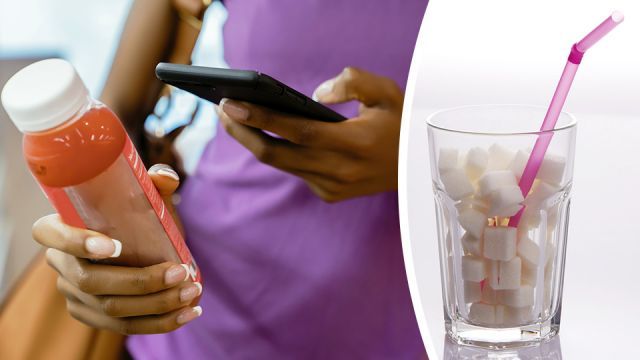
Do you believe that foods and beverages labeled “no added sugar” or “reduced in sugar” are healthier and lower in calories? If you do, you’re not alone. But you’re also in for a big surprise. Just because products say “no sugar added,” it doesn’t mean they’re not loaded with “sugary” calories, report a new study. In fact, some product labels that read “reduced in sugar” may even contain amounts of sugar considered excessive by the World Health Organization.
More than 3,000 products were studied
If your favorite “so-called” calorie-wise products have bold labels that read “no added sugar” it’s time to look a little more closely at the label. A new Canadian study from the University of Toronto found that packaged foods and beverages labeled with claims like “no added sugar” or “reduced in sugar” might be lower in sugar, but they still contain way too many calories or even too much sugar to deem them healthy.
The study, published in the journal Applied Physiology, Nutrition and Metabolism looked at over 3000 products including puddings, yogurts, cereals, fruit drinks, salad dressings, fruit preserves and syrups. Its purpose: to evaluate the differences in calories, nutrient content and overall healthfulness.
Researchers also looked at the use of sweetener ingredients between products with and without sugar claims. Over 600 products had at least one sugar claim. And while products with sugar claims scored higher in health than similar products without claims of added sugar, almost half of these products still contained excessive amounts of “free sugars.”
According to the World Health Organization (WHO), “free sugars” include monosaccharides and disaccharides added to processed foods. They also include sugars naturally occurring in honey, syrups, fruit juices and fruit juice concentrates. So, “free sugars” are those sugars that are removed from their original source like an apple or orange and added to foods usually as a sweetener or as a preservative for longer shelf life.
Added sugar versus free sugar — it’s all so confusing!
The problem is, most of us assume that product labels claiming “no sugar added” are healthier and lower in calories. But that’s not always the case. According to Jodi Bernstein, lead author of the study and PhD student in the Department of Nutritional Sciences, there is “misalignment” in our perception of “added sugar,” and the relative amount of free sugar in products.
In other words, there’s not a heck of a lot of difference between manufacturers adding refined sugars to fruit drinks versus sugars removed from their original source and added back into foods and beverages. What makes this so confusing for the average consumer is that fruit drinks, or products with fruit juice, can still claim “no sugar added” even if they contain excessive amounts of “free sugar.”
In fact, some health drinks labeled “no sugar added” contain as much as 60 grams of “free sugar” per serving! Not surprisingly, free sugars provide lots of energy, but no specific nutrients. And that’s a big, fat diet no-no.
How much sugar is too much?
To determine how much sugar — added or free — in your foods and beverages is too much, let’s first determine what amount is acceptable for your daily diet. In both adults and children, WHO recommends limiting “added sugar” or “free sugar” to 10 percent of your total daily calories.
So, if you’re on a 2,000 calorie per day diet, that means you should only be consuming 200 calories in sugar. There are four calories per one gram of sugar. That means, if you grab a fruit drink labeled 250 calories per serving with “no sugar added” but the ingredients say it contains 60 grams of sugar (free sugars), then you’re consuming 240 calories of sugar per serving in that so-called healthy fruit drink. And as we know, 240 calories of sugar — in one drink alone — exceeds WHO’s recommendation.
Be your own health advocate
Don’t assume that “no sugar added” or “reduced sugar” is automatically a healthier alternative. Become a more informed consumer. Keep in mind, manufacturers want you to eat more — buy more of their product — which means they’ll do what they can to make their product more appealing.
But who has time to read all the food labels, right? If reading labels is not your thing, then avoid processed foods as much as you can, and choose instead a diet filled with more whole foods. Rather than purchasing high-sugar bottled smoothie or fruit drink, make your own smoothie with unsweetened yogurt, fresh blueberries, a frozen banana and a handful of spinach. In the end, it’s up to you, and you alone, to be your own health advocate.
— Katherine Marko

